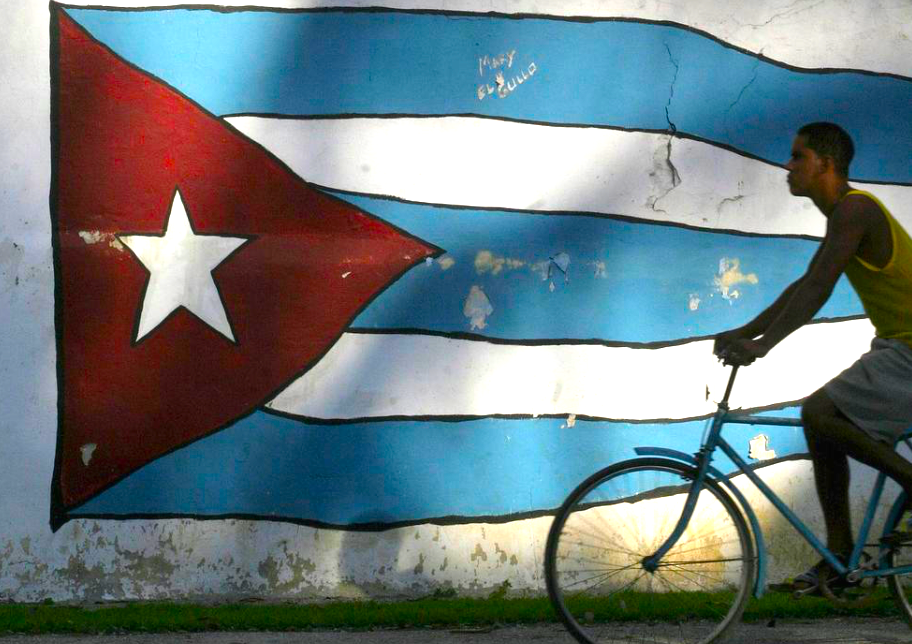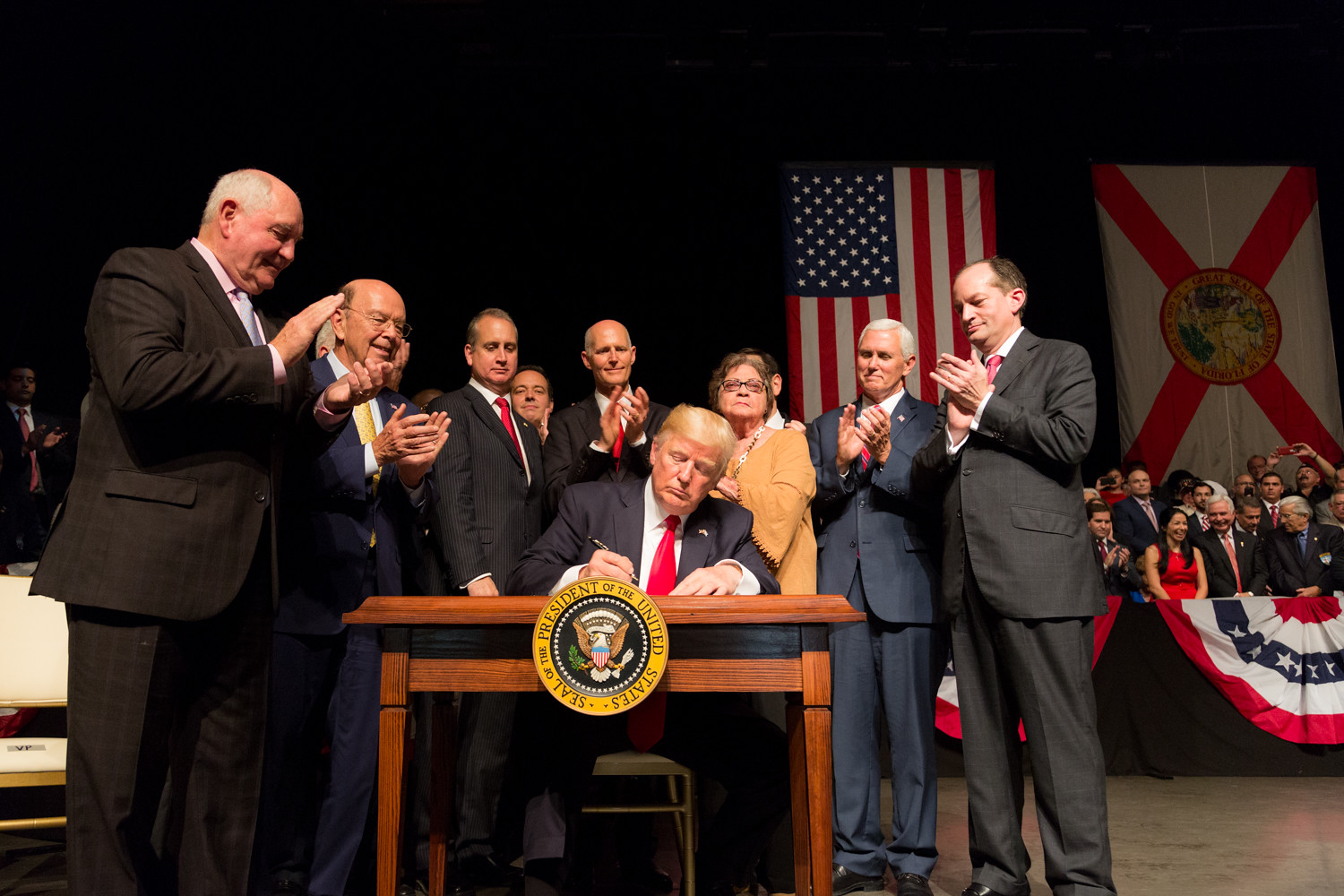Increases in global food prices have aggravated an already precarious situation, writes William M. LeoGrande

Cyclist and mural in Cuba. (Enrique de la Osa, Creative Commons)
By William M. LeoGrande
Common Dreams
 While President Joe Biden dithers about when or whether to keep his campaign promise to roll back Donald Trump’s economic sanctions on Cuba, people on the island are going hungry.
While President Joe Biden dithers about when or whether to keep his campaign promise to roll back Donald Trump’s economic sanctions on Cuba, people on the island are going hungry.
Cuba imports 70 percent of its food and its foreign exchange earnings have plummeted due to the cut-off of remittances by Trump and the closure of the tourism industry by Covid-19. Increases in world market prices for food have aggravated an already precarious situation, producing severe shortages and a looming humanitarian crisis.
Hunger has been a weapon in Washington’s arsenal against Cuba ever since Dwight D. Eisenhower sat in the White House. In January 1960, Ike suggested blockading the island, arguing, “If they (the Cuban people) are hungry, they will throw Castro out.”
In April 1960, Deputy Assistant Secretary of State for Inter-American Affairs Lester D. Mallory proposed,
“Every possible means should be undertaken promptly to weaken the economic life of Cuba…to bring about hunger, desperation and overthrow of government.”
President John F. Kennedy imposed the most comprehensive economic embargo that the United States has ever imposed on any country, including prohibitions on both food and medicine sales. The core of that embargo has remained in place ever since.
From 1975 to 1992, Cuba could buy goods from the subsidiaries of U.S. companies in third countries. Ninety percent of the $700 million in goods Cuba bought annually was food and medicine.
President George H. W. Bush, with presidential candidate Bill Clinton’s support, signed the 1992 Cuban Democracy Act, cutting off those sales just as the Cuban economy collapsed due to the loss of Soviet aid. Cubans went hungry then, too. “Food shortages and distribution problems have caused malnutrition and disease,” the CIA reported in August 1993.

June 16, 2017 : President Donald J. Trump signing an order to reimpose some sanctions on Cuba. (White House, Shealah Craighead)
The Trump administration’s campaign of “maximum pressure” was designed to block Cuba’s sources of foreign exchange earnings by limiting U.S. travel, remittances, and Cuba’s earnings from the export of medical services. The goal, Secretary of State Mike Pompeo told European diplomats, was to “starve” the island to bring down the regime. So far, Biden has left all these sanctions in place.
Even though the United States no longer prohibits the sale of food to Cuba, by intensifying economic sanctions, Washington impedes Cuba’s ability to earn enough money to buy adequate food supplies from anywhere. Moreover, by exacerbating food shortages, forcing Cubans to stand in line for hours in the midst of the pandemic, U.S. policy also impedes Cuba’s ability to control the spread of Covid.
Human Rights Violation
The international community regards using food as an instrument of coercion to be a violation of international humanitarian law. In 2018, the UN Security Council voted unanimously to approve Resolution 2417, which condemns the deliberate deprivation of food “in conflict situations” as a threat to international peace and security. Resolution 2417 focuses on armed conflicts, but the underlying principle is no less applicable to conflicts in which one country has the ability to impose food insecurity on another, even without the use of armed force.
The international community has also made clear what it thinks of the U.S. embargo. Since 1992, the United Nations General Assembly has annually voted overwhelmingly for a resolution calling on the United States to lift the embargo because of its “adverse effects…on the Cuban people.” In 2019, the vote was 187 in favor, three against (the United States, Israel, and Brazil).
The Biden administration has yet to complete its review of Cuba policy, but officials, when asked, never fail to say that it will center on democracy, human rights, and “empowering the Cuban people.” In his confirmation hearing, Brian Nichols, Biden’s nominee to be Assistant Secretary of State for Western Hemisphere Affairs, declared, “We should be focusing our efforts on what is best for the Cuban people.”
On Cuban Independence Day, Secretary of State Anthony Blinken addressed the Cuban people directly, assuring them, “We recognize the challenges many of you face in your daily lives,” and pledged, “We will support those improving the lives of families and workers.”
Fine sentiments, but their sincerity is belied by the Trump-era sanctions that the Biden administration has done nothing to change, sanctions that make the daily lives of Cuban families harder. Having enough to eat is a basic human right, too, as President Franklin D. Roosevelt affirmed when he included “Freedom from Want” among his “Four Freedoms.” Article 25 of the Universal Declaration of Human Rights, which the United States signed, includes adequate food as a right.
If Biden wants to support human rights in Cuba and empower the Cuban people, he can start by alleviating the food crisis by ending Trump’s prohibition on remittances and restoring the right of U.S. residents to travel. Remittances put money directly into the pockets of Cuban families.
Restoring the right to travel will help Cuba’s ailing private sector recover post-Covid. The resulting inflow of foreign exchange currency will enable the government to import more food, especially for marginalized populations — single mothers, the elderly, and the poor — who have no direct access to hard currency.
There is no excuse for delay. No long, drawn out policy review is needed to recognize that there is a food crisis in Cuba due in part to U.S. policies, and that helping alleviate it is a moral obligation—an extension of the responsibility to protect. Moreover, these are actions Biden promised he would take during the presidential campaign. Every day he delays is another day that Cubans go hungry.
William M. LeoGrande is professor of government at American University in Washington, D.C., and co-author with Peter Kornbluh of Back Channel to Cuba: The Hidden History of Negotiations between Washington and Havana (University of North Carolina Press, 2015).
This article is from Common Dreams.
The views expressed are solely those of the author and may or may not reflect those of Consortium News.

But why does Cuba have to import almost three-quarters of its food supply? Isn’t it a largely rural country in a fruitful subtropical climate!
I have my doubts about the claim that Cuba imports three-quarters of its food. Havana, the largest urban centre, is nearly self-sufficient in vegetables. I expect this is true of other urban centres and rural areas as well. Perhaps that claim about importing three-quarters of its food takes into account food fed to tourists which would be a substantial amount at some times of the year.
One good thing comes out of seeing this horror – people will also see more how much America is led by a few people devoted to extracting profit from other people at any price and do not want a socialist nation that has taken care of its people to succeed. It is related to how: even though union membership is lower than ever, allowing even one good large union to exist is a threat because the rest of us can see how well workers can be treated when there is a union to fight for them. e.g. UAW It is no different than with other really socialist countries – where workers are treated well and the country is under constant economic (and military) attack from the murderous profit boys – who then claim the wounds they inflicted are really caused by socialism.
We know that the last 3 decades of political leaders and their teams have been increasingly incompetent, but one thing is more glaringly ineffective, to say stupid- sanctions. It was an idea. OK, try it, but try it and try it and try it when it’s never works is borderline moronic.
To use it uselessly against great powers like Chine or Russiais amateur politics, but against small,weak nations like Cuba and Venezuela is both stupid and inhumane.
It only makes our world position drop a little more.
Sure, Joe, you and all the American presidents before you have only been interested in raising the living standards of the Cuban people, most notably to bless them with “democracy” and purge their socialist government. Well, the Cuban people back in 1959 overthrew a government which oppressed and exploited them, I think it was run by a cabal of bandits in league with Washington and its interests. Who knows, the Cuban people might rise up again and engineer another home-grown “regime change.” Only thing is, Joe, you and the rest of Washington will not recognise the validity of any such move unless the new cast of characters was chosen and supported by you.
According to your formula, any new leadership will have to be formulated and chosen the way the Washington imperialists decided Juan Guaido to be the president of Venezuela or Sviatlana?Tsikhanouskaya the head of Belarus, by American proclamation.
In my book, it is the farthest thing from democracy that you really want in Cuba and in a multitude of other countries that you gangsters just love to pick on. It is complete and unmitigated control of these foreign lands that your grasping avaricious lot seeks. You are fooling no one. You give yourselves away as soon as you start starving the populace of food, medicine and other essentials of life in a vain attempt to alienate them from their extant leadership, very frequently democratically chosen by them.
Your preposterous press releases only indicate you are playing the same loathsome trick in places like Syria, Venezuela and even Iran. The people of those countries spoke, the votes were counted… probably more accurately than they were in Washington, but you would starve them to death rather than loosening your designs on running those countries from the DC Swamp.
To deprive of food is one of the most immoral actions one can take. What threat is Cuba to the US, anyway?
My question is…what on earth are the 187 nations out of 190 doing about it apart from their UN votes? Are they so cowed by attracting the ire of the US empire they cannot help the Cubans or dont they really care that much?
The answer to the first part of your second question is YES.
But given the power of the empire to punish any entity that deals with Cuba,
the solution to the problem is primarily in Washington — and Florida.
THIS IS A CASE OF AMERICAN EXCEPTIONALISM IN ACTION .
Exceptional cruelty